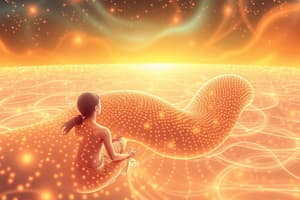Podcast
Questions and Answers
What is the main difference between complementary medicine and alternative medicine?
What is the main difference between complementary medicine and alternative medicine?
- Complementary medicine focuses on spirituality, while alternative medicine focuses on holistic healing
- Complementary medicine is based on ancient practices, while alternative medicine is based on recent therapies
- Complementary medicine is practiced in Western cultures, while alternative medicine is practiced in non-Western cultures
- Complementary medicine is used together with conventional medicine, while alternative medicine is used instead of conventional medicine (correct)
Which concept emphasizes the viewpoint that mind and body are indivisible, and well-being is a combination of personal satisfaction and contributions to the larger community?
Which concept emphasizes the viewpoint that mind and body are indivisible, and well-being is a combination of personal satisfaction and contributions to the larger community?
- Balance
- Holism
- Humanism (correct)
- Spirituality
What does spirituality involve according to the text?
What does spirituality involve according to the text?
- Relationship with others only
- Relationship with self only
- Relationship with higher power only
- Relationship with self, others, and higher power (correct)
Which statement best describes the degree of involvement with spiritual community mentioned in the text?
Which statement best describes the degree of involvement with spiritual community mentioned in the text?
What characterizes Western medical practices as mentioned in the text?
What characterizes Western medical practices as mentioned in the text?
What is the primary focus of naturopathy?
What is the primary focus of naturopathy?
How does acupuncture work?
How does acupuncture work?
What is the primary objective of guided imagery?
What is the primary objective of guided imagery?
What is the main purpose of biofeedback?
What is the main purpose of biofeedback?
How does music therapy primarily help during procedures?
How does music therapy primarily help during procedures?
What is the ultimate goal of the theory mentioned in the text?
What is the ultimate goal of the theory mentioned in the text?
What is the term used for the study of distance between people in their interactions?
What is the term used for the study of distance between people in their interactions?
Which component of cultural competence involves face-to-face encounters with individuals from diverse backgrounds and adapting previously held beliefs to prevent stereotyping?
Which component of cultural competence involves face-to-face encounters with individuals from diverse backgrounds and adapting previously held beliefs to prevent stereotyping?
What should caregivers be aware of when working in a patient's intimate zone, according to the text?
What should caregivers be aware of when working in a patient's intimate zone, according to the text?
What is the main focus of culturally responsive care, as described in the text?
What is the main focus of culturally responsive care, as described in the text?
Which term refers to the state of being different in terms of sex, gender, age, culture, ethnicity, socioeconomic status, educational attainment, and religious affiliation?
Which term refers to the state of being different in terms of sex, gender, age, culture, ethnicity, socioeconomic status, educational attainment, and religious affiliation?
What does cultural competence refer to in the context of healthcare?
What does cultural competence refer to in the context of healthcare?
Which aspect of culture encompasses thoughts, communications, actions, customs, beliefs, values, and institutions of racial, ethnic, religious, or social groups?
Which aspect of culture encompasses thoughts, communications, actions, customs, beliefs, values, and institutions of racial, ethnic, religious, or social groups?
What is the term for caregiver's ability to communicate effectively with patients from different cultural backgrounds?
What is the term for caregiver's ability to communicate effectively with patients from different cultural backgrounds?
Which term refers to the beliefs, customs, and values that influence physical assessment in healthcare?
Which term refers to the beliefs, customs, and values that influence physical assessment in healthcare?
What does ethnocentrism refer to?
What does ethnocentrism refer to?
What is the main goal of the Theory of Culture Care: Diversity and Universality?
What is the main goal of the Theory of Culture Care: Diversity and Universality?
What is the definition of prejudice?
What is the definition of prejudice?
What does diversity, equity, and inclusion (DEI) aim to achieve in healthcare?
What does diversity, equity, and inclusion (DEI) aim to achieve in healthcare?
What is stereotyping in the context of cultural concepts?
What is stereotyping in the context of cultural concepts?
Which traditional Latin American healing system uses religious rituals, herbs, cleansing rites, and prayers in their healing therapies?
Which traditional Latin American healing system uses religious rituals, herbs, cleansing rites, and prayers in their healing therapies?
What is the focus of Traditional Chinese Medicine (TCM)?
What is the focus of Traditional Chinese Medicine (TCM)?
What does Ayurveda, the traditional Indian system of medicine, focus on?
What does Ayurveda, the traditional Indian system of medicine, focus on?
Which healing modality emphasizes the uninterrupted flow of body energy or Qi?
Which healing modality emphasizes the uninterrupted flow of body energy or Qi?
What is the central belief of Native American Healing?
What is the central belief of Native American Healing?
Which term refers to the process of developing a new cultural identity by incorporating traits from another culture, often from the host society or dominant culture?
Which term refers to the process of developing a new cultural identity by incorporating traits from another culture, often from the host society or dominant culture?
What does the term 'ethnography' refer to in the context of cultural concepts?
What does the term 'ethnography' refer to in the context of cultural concepts?
What is the relationship between the terms 'ethnicity' and 'race' as mentioned in the text?
What is the relationship between the terms 'ethnicity' and 'race' as mentioned in the text?
What does 'racism' refer to as discussed in the text?
What does 'racism' refer to as discussed in the text?
What does 'cultural desire' encompass as mentioned in the text?
What does 'cultural desire' encompass as mentioned in the text?
Which term refers to the study of human cultures with a focus on cultural patterns of behaviors and thoughts?
Which term refers to the study of human cultures with a focus on cultural patterns of behaviors and thoughts?
What is the term for the process of incorporation of traits from another culture, often from the host society or dominant culture?
What is the term for the process of incorporation of traits from another culture, often from the host society or dominant culture?
Which concept holds no scientific merit and groups humans based on ancestry and cultural & social characteristics?
Which concept holds no scientific merit and groups humans based on ancestry and cultural & social characteristics?
What is referred to as assumptions held about other groups such as that race is biologically discrete and unequal?
What is referred to as assumptions held about other groups such as that race is biologically discrete and unequal?
Which term emphasizes the relationship among individuals who believe they share cultural characteristics that make them a distinct group?
Which term emphasizes the relationship among individuals who believe they share cultural characteristics that make them a distinct group?
Flashcards are hidden until you start studying
Study Notes
Complementary vs. Alternative Medicine
- Complementary medicine is used alongside conventional treatments, whereas alternative medicine replaces conventional treatments entirely.
Mind-Body Connection and Well-Being
- The concept of well-being as a combination of personal satisfaction and contributions to the community emphasizes the indivisible nature of mind and body.
Spirituality
- Spirituality involves personal growth, inner peace, and connections to a higher power or purpose.
Involvement with Spiritual Community
- Involvement with a spiritual community can vary, but it often indicates a shared belief and support system among individuals.
Western Medical Practices
- Characterized by a focus on scientific evidence, technology, and biological understandings of health and illness.
Naturopathy
- Primary focus is on holistic approaches to health, emphasizing natural remedies and the body's ability to heal itself.
Acupuncture
- Works by stimulating specific points on the body, believed to balance the flow of energy (Qi) and promote healing.
Guided Imagery
- Aims to enhance relaxation and mental imagery for therapeutic purposes, often used in pain management and stress reduction.
Biofeedback
- Its main purpose is to train individuals to control physiological functions by providing real-time feedback from their bodies.
Music Therapy
- Primarily helps to reduce anxiety and enhance relaxation during medical procedures through rhythm and melody.
Theory Objective
- The ultimate goal of the theory mentioned is to promote holistic health and improved patient outcomes through comprehensive care approaches.
Proxemics
- The study of the distance between people in their interactions is known as proxemics.
Cultural Competence Component
- Involves direct encounters with diverse individuals and adapting beliefs to eliminate stereotypes.
Caregiver Awareness
- Caregivers should be sensitive to personal space and cultural norms when working in a patient’s intimate zone.
Culturally Responsive Care
- Focus is on providing care that recognizes and respects the cultural identities of patients.
Diversity
- Refers to the state of being different in aspects such as sex, gender, age, culture, ethnicity, socioeconomic status, and religion.
Cultural Competence in Healthcare
- Refers to the ability of healthcare providers to understand and respond effectively to the cultural needs of patients.
Cultural Aspects
- Encompasses thoughts, communications, actions, customs, beliefs, values, and social group institutions.
Effective Communication
- A caregiver's ability to communicate effectively with patients from different cultural backgrounds is termed cultural sensitivity.
Influencing Beliefs
- Refers to the beliefs, customs, and values that shape physical assessments in healthcare settings.
Ethnocentrism
- Represents the belief that one's own culture is superior to others, often leading to biased views.
Theory of Culture Care: Diversity and Universality
- Aims to promote cultural understanding and provide care that is sensitive to diverse cultural backgrounds.
Prejudice Definition
- Refers to preconceived opinions or judgments about individuals based solely on their membership in a particular group.
Diversity, Equity, and Inclusion (DEI)
- Aims to create an equitable healthcare environment where diverse backgrounds are acknowledged and included.
Stereotyping
- Involves oversimplified and fixed ideas regarding cultural groups, often leading to misrepresentation and bias.
Traditional Latin American Healing
- Healers use religious rituals, herbs, cleansing rites, and prayers as part of their therapeutic practices.
Traditional Chinese Medicine (TCM)
- Focuses on balancing the body's energy (Qi) and incorporating diet, acupuncture, and herbal remedies for health.
Ayurveda
- The traditional Indian medical system that emphasizes balance in bodily systems through diet, herbal treatments, and lifestyle.
Qi
- Represents the uninterrupted flow of body energy in various healing modalities.
Native American Healing
- Centers on harmony with nature, community ties, and spiritual practices for holistic health.
Cultural Identity Development
- The process of developing a new cultural identity by integrating traits from another culture is known as acculturation.
Ethnography
- Refers to the systematic study of human cultures and their behaviors.
Ethnicity vs. Race
- Ethnicity pertains to cultural factors, while race often pertains to physical characteristics used to categorize groups.
Racism Definition
- Refers to systemic prejudices and discrimination against individuals based on their perceived racial identities.
Cultural Desire
- Encompasses the willingness to learn about and engage with diverse cultures respectfully and meaningfully.
Study of Cultures
- Anthropology is the study of human cultures, focusing on behaviors and belief patterns that define them.
Incorporation of Traits
- Acculturation involves adopting traits from another culture, often leading to cultural blending.
Scientific Merit of Concepts
- Concepts like race that lack scientific foundation oversimplify the complexity of human variation and culture.
Assumptions About Other Groups
- Includes beliefs that misconceptions regarding race and cultural characteristics are biologically based and hierarchical.
Shared Cultural Characteristics
- Refers to the formation of an ethnic group, where individuals believe they share distinct cultural traits.
Studying That Suits You
Use AI to generate personalized quizzes and flashcards to suit your learning preferences.




